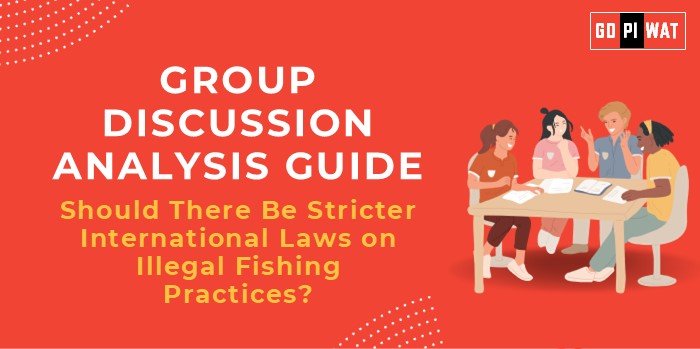🌊 Group Discussion (GD) Analysis Guide
🎣 Topic: Should There Be Stricter International Laws on Illegal Fishing Practices?
🌟 Introduction to the Topic
Opening Context: “Illegal, unreported, and unregulated (IUU) fishing costs the global economy billions annually while threatening marine ecosystems, biodiversity, and the livelihoods of coastal communities. As overfishing intensifies, stricter international laws are increasingly viewed as essential to sustainable ocean governance.”
Topic Background: Illegal fishing refers to activities that violate regional, national, or international fisheries laws. IUU fishing undermines conservation efforts, with an estimated 11-26 million tons of fish illegally caught each year. The United Nations’ Sustainable Development Goal 14 calls for the protection of marine life, making this issue critical for global policy.
📊 Quick Facts and Key Statistics
- Economic Impact: $26-50 billion lost annually due to IUU fishing (FAO, 2023).
- Affected Regions: 40% of illegal fishing occurs in developing countries, harming local economies.
- Biodiversity Threat: 85% of global fish stocks are overexploited or depleted (WWF, 2023).
- Global Legislation: 75 countries are party to the Port State Measures Agreement (PSMA), the first binding international treaty to combat IUU fishing.
👥 Stakeholders and Their Roles
- Governments: Establish regulations, enforce laws, and engage in international agreements.
- NGOs: Monitor IUU activities, promote sustainable practices, and raise awareness.
- International Organizations: UN and FAO provide frameworks and support coordination among nations.
- Fishing Industries: Implement responsible practices and adhere to quotas.
- Local Communities: Depend on sustainable fishing for livelihoods.
🏆 Achievements and Challenges
✔️ Achievements:
- Adoption of the PSMA, enhancing global collaboration.
- Use of satellite technology to track illegal activities.
- Establishment of marine protected areas (MPAs).
⚠️ Challenges:
- Enforcement gaps in high seas jurisdictions.
- Insufficient cooperation among nations.
- Financial barriers for developing countries to adopt monitoring technologies.
Global Comparisons:
- Success Story: Norway uses advanced surveillance to manage fisheries, achieving near-total compliance.
- Challenges Persist: Southeast Asia, where weak governance leads to rampant illegal fishing.
📌 Structured Arguments for Discussion
- Supporting Stance: “Stricter international laws are necessary to ensure marine biodiversity is protected and local economies dependent on fisheries are not jeopardized.”
- Opposing Stance: “Stricter laws may disproportionately burden developing nations without adequate funding or enforcement capacity.”
- Balanced Perspective: “While stricter international laws are critical, they must be accompanied by financial and technical support for developing countries.”
🎯 Effective Discussion Approaches
- Opening Approaches:
- Statistical Impact: “Illegal fishing costs $50 billion annually and affects 40% of coastal economies in developing nations…”
- Case Study Reference: “The success of Norway’s fisheries management shows that strict laws, when enforced, can work…”
- Counter-Argument Handling:
- Acknowledge enforcement challenges.
- Propose capacity-building partnerships.
- Reference data showing positive outcomes from existing laws.
🛠️ Strategic Analysis of Strengths and Weaknesses
- Strengths: Potential to restore fish stocks; encourages international collaboration.
- Weaknesses: Enforcement challenges in high seas; costs for monitoring and compliance.
- Opportunities: Technological advancements like AI-based monitoring; economic gains from sustainable practices.
- Threats: Resistance from countries dependent on IUU fishing; climate change exacerbating overfishing.
🔗 Connecting with B-School Applications
- Real-World Applications: Projects in sustainability management and policy analysis; exploring international collaboration for resource management.
- Sample Interview Questions:
- “How can technology aid in combating illegal fishing?”
- “What role can international organizations play in ensuring compliance with stricter laws?”
- Insights for B-School Students:
- Study the economic implications of IUU fishing.
- Explore the role of business in promoting sustainable fisheries.


